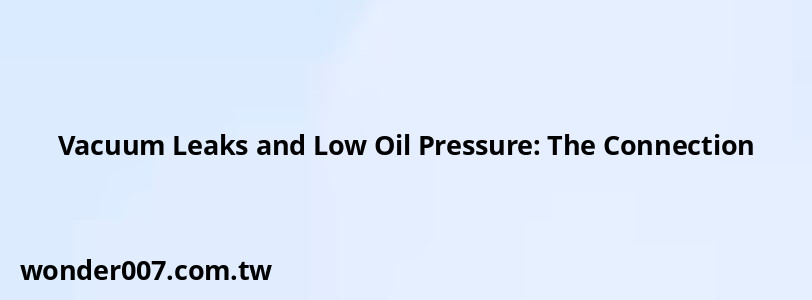Vacuum Leaks and Low Oil Pressure: The Connection

Understanding Vacuum Leaks
A vacuum leak occurs when air enters a vehicle's engine through unintended openings. These leaks can disrupt the delicate balance of air and fuel mixture, potentially affecting various engine components and systems.
The Relationship Between Vacuum Leaks and Oil Pressure
While vacuum leaks don't directly cause low oil pressure, they can indirectly contribute to this issue. Here's how:
Increased Engine Stress
Vacuum leaks can cause the engine to run less efficiently, leading to increased stress on engine components. This added stress may accelerate wear on bearings and other moving parts, potentially resulting in reduced oil pressure over time.
Crankcase Ventilation Issues
Many engines use vacuum to assist with crankcase ventilation. A vacuum leak can disrupt this process, potentially leading to:
- Increased crankcase pressure
- Oil contamination
- Accelerated oil breakdown
These factors may contribute to reduced oil pressure in some cases.
False Readings
In some instances, a vacuum leak near an oil pressure sensor might cause inaccurate readings. This could lead to a false indication of low oil pressure when the actual pressure is within normal range.
Diagnosing the Issue
To determine if a vacuum leak is affecting your oil pressure:
- Check for obvious signs of vacuum leaks (hissing sounds, rough idle)
- Perform a smoke test to detect small leaks
- Use a vacuum gauge to measure engine vacuum
- Monitor oil pressure with a mechanical gauge for accuracy
Addressing the Problem
If you suspect a vacuum leak is contributing to low oil pressure:
1. Locate and repair all vacuum leaks
2. Change the engine oil and filter
3. Inspect oil passages for blockages
4. Check the oil pump for proper operation
5. Evaluate engine bearings for excessive wear
Prevention
To prevent vacuum leaks and maintain proper oil pressure:
- Regularly inspect vacuum lines and connections
- Replace worn gaskets and seals promptly
- Follow recommended maintenance schedules
- Use high-quality engine oil appropriate for your vehicle
FAQs About Vacuum Leaks and Oil Pressure
- Can a vacuum leak cause immediate low oil pressure?
No, vacuum leaks typically don't cause immediate low oil pressure. The effects are usually gradual and indirect. - How often should I check for vacuum leaks?
It's a good practice to inspect for vacuum leaks during regular oil changes or at least once a year. - What are common symptoms of a vacuum leak?
Common symptoms include rough idle, decreased fuel efficiency, and a hissing sound from the engine bay.
Related Posts
-
AC Pro Connection Issues: Troubleshooting Guide
29-01-2025 • 186 views -
Sock Stuck In Shark Vacuum Hose: Quick Fix Guide
29-01-2025 • 158 views -
1999 Chevy Tahoe 5.7 Vacuum Hose Routing Guide
27-01-2025 • 145 views -
Pink Wire Connection in Car Stereo Systems
27-01-2025 • 82 views -
Low Oil Pressure: Causes and Solutions
30-01-2025 • 195 views
Latest Posts
-
Are O2 Sensors Covered Under Warranty
01-02-2025 • 300 views -
How To Turn Off Paddle Shifters Mercedes
01-02-2025 • 289 views -
Rear Brake Caliper Piston Won't Compress
01-02-2025 • 273 views -
Power Steering Fluid Leak On Passenger Side
01-02-2025 • 369 views -
2015 Chevy Traverse AC Recharge Port Location
01-02-2025 • 327 views
Popular Posts
-
EPC Light: Understanding Causes and Solutions
26-01-2025 • 968 views -
V12 Engine Costs: What You Need to Know
26-01-2025 • 551 views -
Power Steering and ABS Light On: Causes and Solutions
27-01-2025 • 569 views -
2015 VW Passat Oil Consumption Issues Explained
26-01-2025 • 532 views -
EPC Warning Light: What It Means for Your Vehicle
27-01-2025 • 549 views
